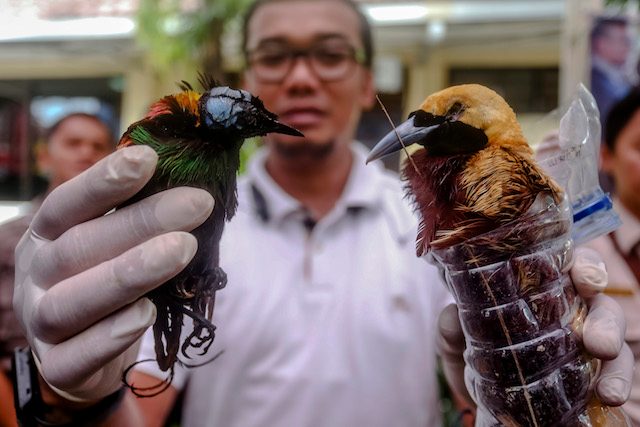SUMMARY
This is AI generated summarization, which may have errors. For context, always refer to the full article.

JAKARTA, Indonesia – 13 species of Indonesian birds, including the country’s symbolic Javan Hawk-eagle, are at serious risk of extinction mainly due to the pet trade, a wildlife watchdog warned Wednesday, May 25.
The vast Indonesian archipelago is home to a dizzying array of birds and keeping them as pets has long been part of the national culture, with birdcages a common sight outside homes and shops across the country.
However increasing demand for some species as pets has led to dramatic population declines, wildlife trade monitoring network TRAFFIC warned in a new study.
“This is a multi-million-dollar industry, there’s a huge criminal element and many people are profiting illegally from this business,” Chris Shepherd, TRAFFIC’s director for Southeast Asia and a co-author of the study, told AFP.
Huge demand for songbirds in Indonesia has also put bird species in other countries such as Malaysia and Thailand in danger, Shepherd said.
The Javan Hawk-eagle is Indonesia’s national bird and the inspiration for the Garuda, the mythical winged creature that adorns the country’s coat of arms.
Other species at risk of extinction include the Silvery Woodpigeon, Yellow-crested Cockatoo, Scarlet-breasted Lorikeet, Javan Green Magpie, Black-winged Myna, Bali Myna, Straw-headed Bulbul, Javan White-eye, Rufous-fronted Laughingthrush, Sumatran Laughingthrush and Java Sparrow.
The Helmeted Hornbill is also at risk but unlike the others, is not kept as a pet. Thousands are being illegally killed and traded for their unique “casques” – a solid lump of fibrous protein that runs along the top of the bill and onto the skull.
It is used as a substitute for elephant ivory, to meet demand in China, according to TRAFFIC.
It is illegal to hunt birds in the wild in Indonesia and sell them as pets but critics say the law is often flouted, and major bird markets in cities still operate freely.
Shepherd said that government efforts to crack down on the illegal wildlife trade too often focused on endangered species such as orangutans, tigers and elephants, and did not do enough to protect birds.
The TRAFFIC report called for a range of solutions to tackle the problem, including better law enforcement and public awareness campaigns. – Rappler.com
Add a comment
How does this make you feel?
There are no comments yet. Add your comment to start the conversation.